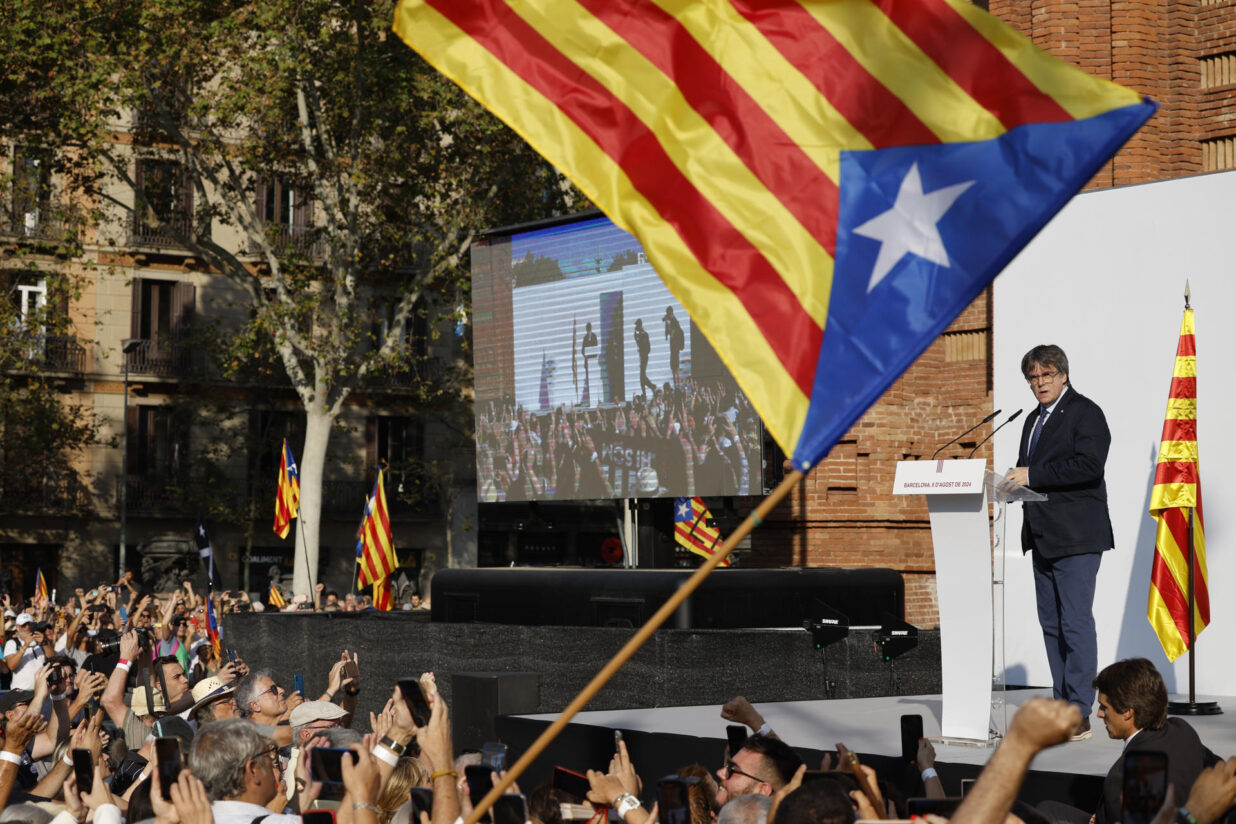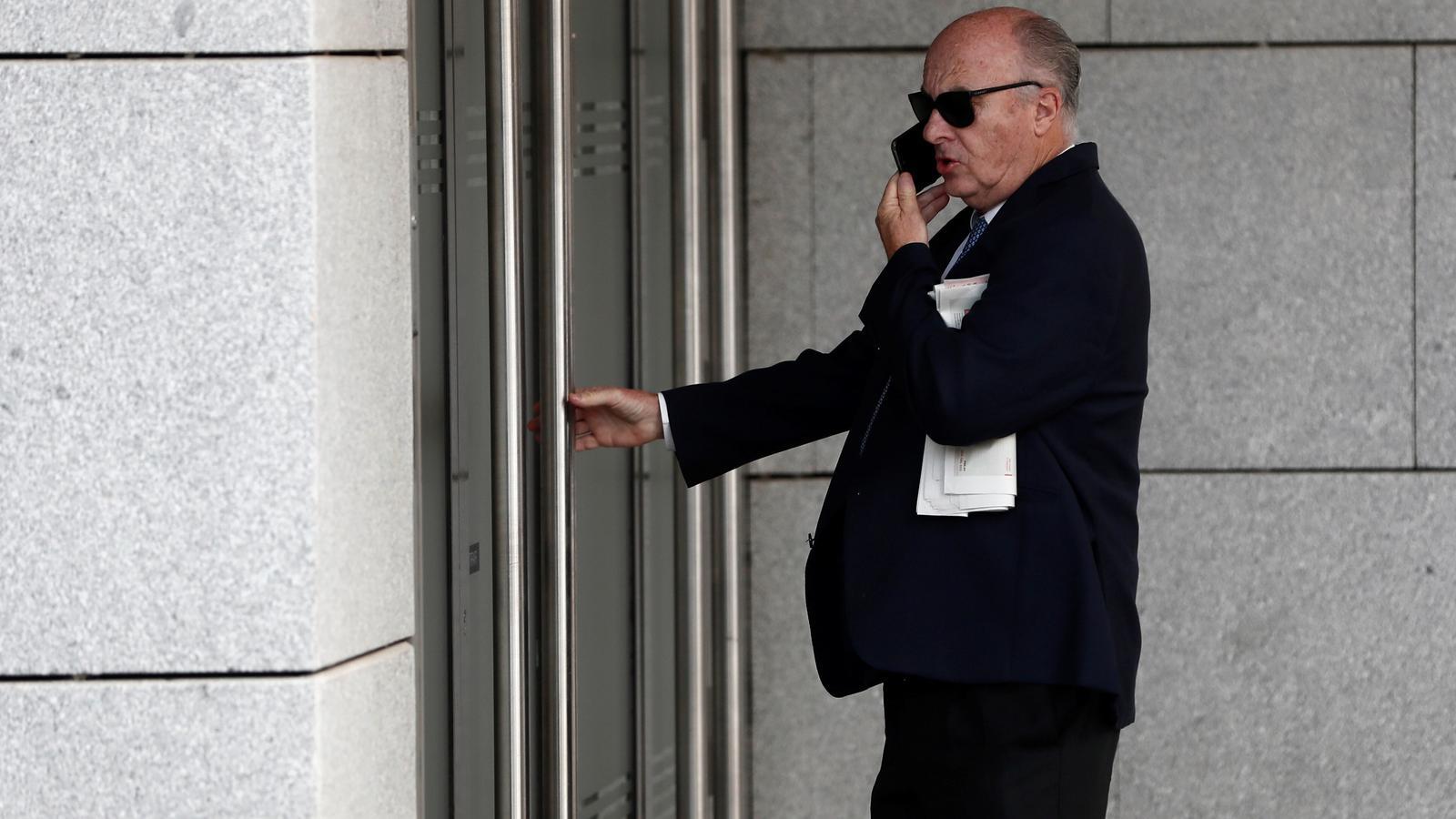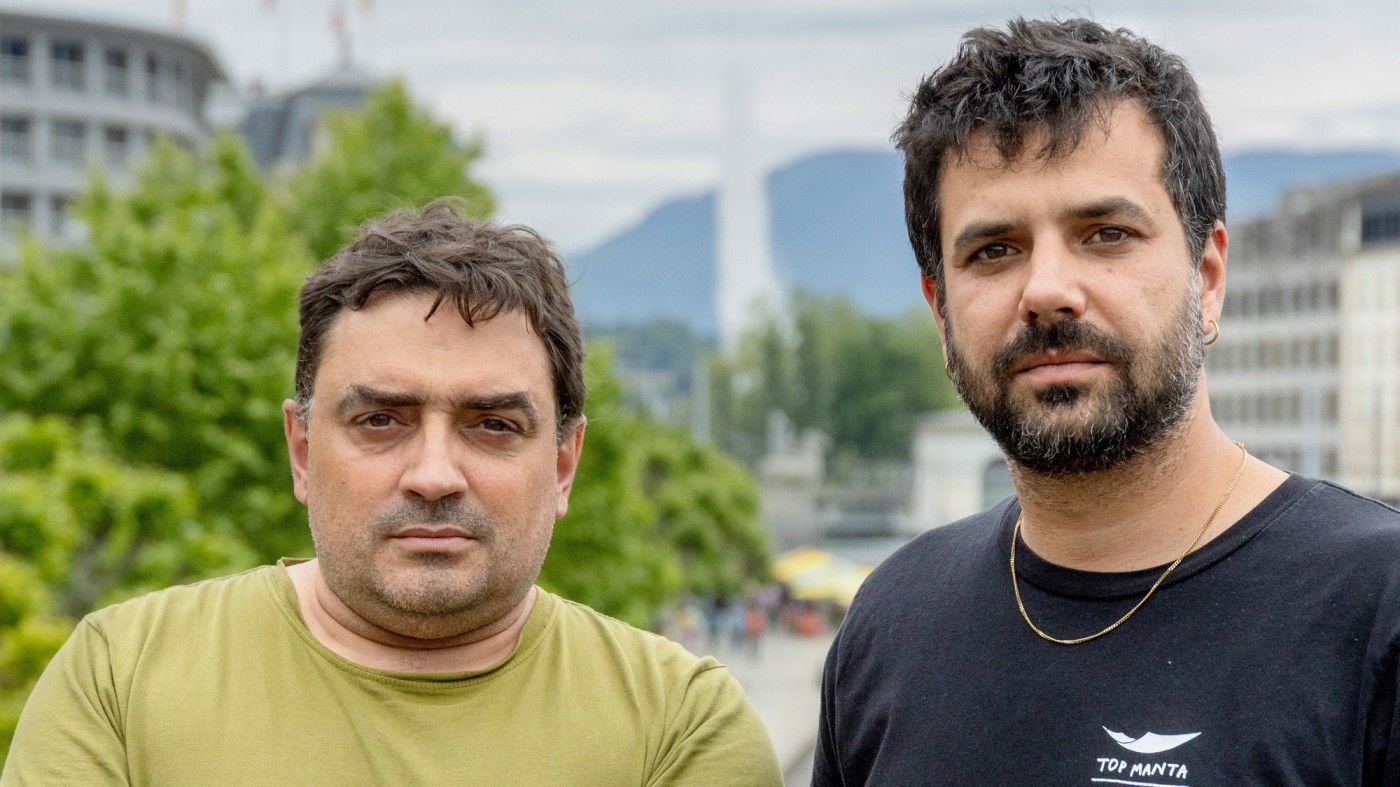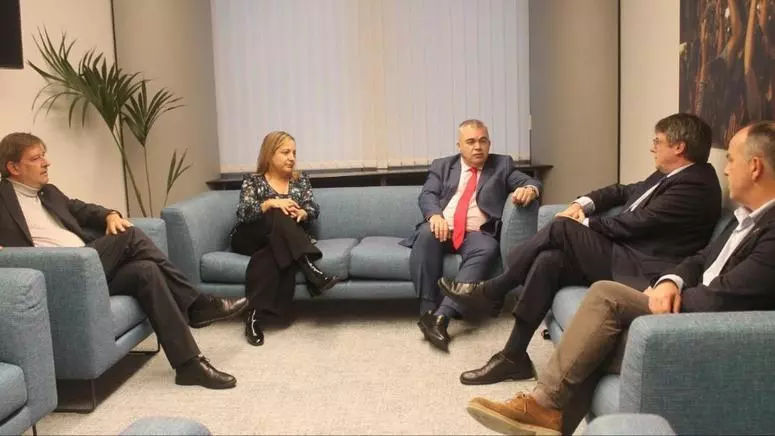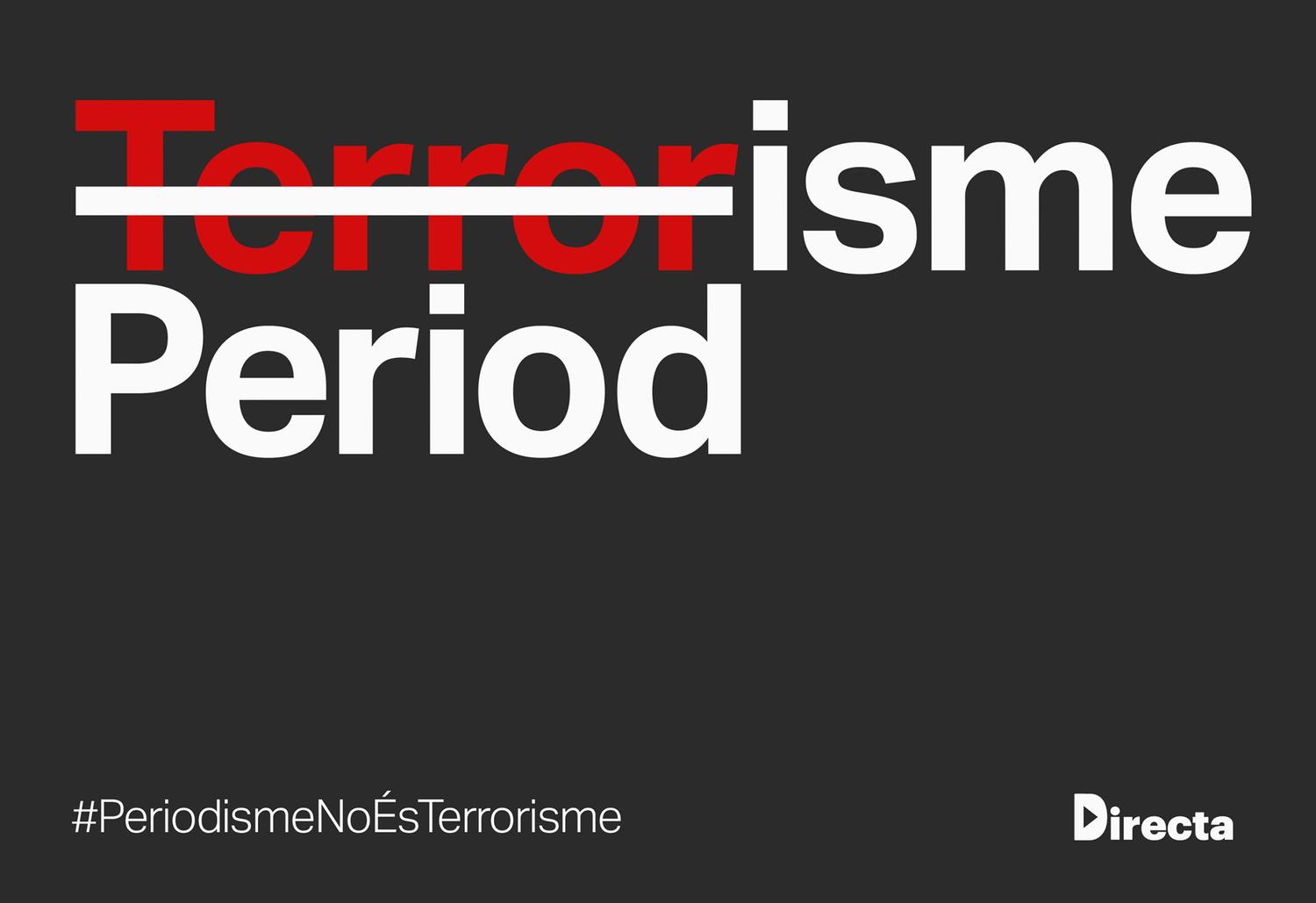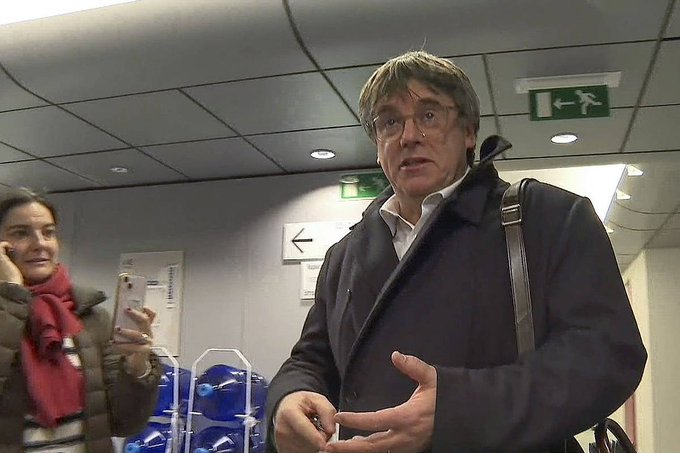Interview with Anna Gabriel back from exile
- Almost five years have passed since the exile of Anna Gabriel Sabaté to Switzerland, with Jordi and part of the Catalan government in prison. Since then the situation has changed a great deal: the investiture session of Carles Puigdemont, the appointment and disqualification of Quim Torre, the Procés ruling, the autumn response of 2019, arrests, trials and penalties, pardons. The former CUP deputy and secretary general of the Swiss trade union UNIA, together with Geneva, has given a first interview to the Direct Media after his return to the Catalan countries. They talk to him in Sallent, Bages, where he was born, lived and militated, where he was also a councilor.
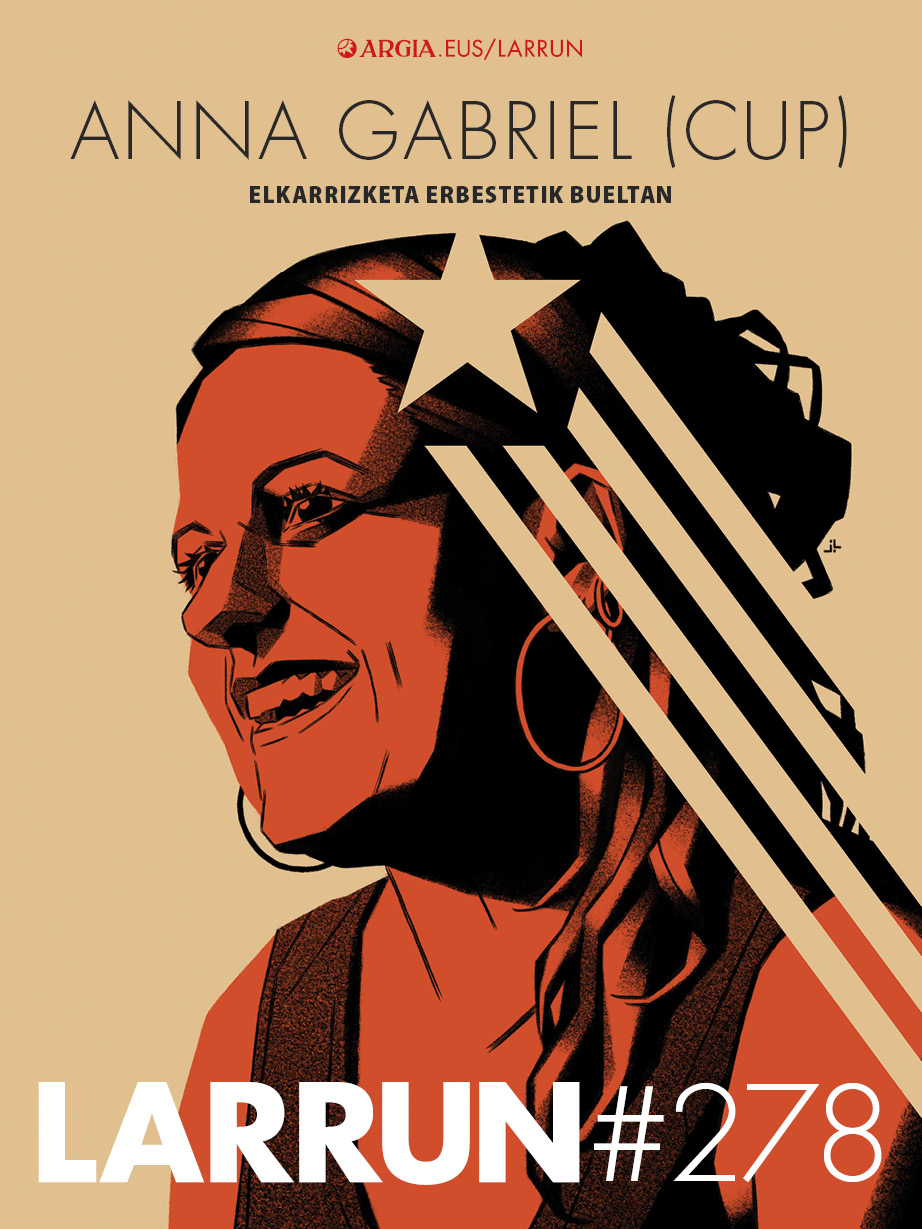
In July he appeared in Madrid before the Supreme Court and was seized of the search and arrest warrant. Subsequently, on September 14, Pablo Llarena was convicted of a crime of disobedience before the judge. He was released on charges and without precautionary measures. They have spoken to Gabriel Sabaté at the Ateneo Popular Rocaus, in an emblematic space of his people, which contributed to its creation. The name of the Athenaeum refers to the masía of the brothers Guitó, uncles of the guerrilla Marcel·lí Massana, who in 1949 were shot to death by the Civil Guard after being arrested for giving protection to their fellow mock-ups.
Who and how has helped him build an extraordinary life of normality?
There is an organized Catalan community, but it is not a network or community designed or prepared to welcome exiled people: it organizes activities, tries to keep the language alive, celebrates some parties or dyads. There are people who come to you individually and tell you that they are willing to collaborate, but the network that began to be built upon arrival is mainly that formed by Swiss militants of different origin, which has allowed me to receive and find housing and employment, and that I can develop in a foreign country. I believe that the anti-capitalist or left-wing militants have the advantage that if there is an anti-capitalist network it becomes active quickly.
What is the hardest thing to live away from home?
Being a foreign person in a country that needs papers on a daily basis. That is, what is the most material stage, to achieve practical conditions of adaptation to daily life. At the same time, if the struggle continues in your country, you live in exile in a certain way and, of course, when the political situation is current, exile is emptied a lot of content; or I, above all, have lived it like this. In addition, in our exile there has been a phase of global pandemic that has closed borders. When you live in a country that is not yours, you feel the borders clear and transparent because no one of us can cross them, it has been very difficult. I had planned exile, but I had not expected it to come with a pandemic.

During that time he has been away from the media. Why?
When I arrived in Switzerland, there was massive media chaos. I called for my exile – Switzerland immediately gives it – and I denounced the context, and warned that if the extradition request came, we would ask for political asylum with all that it means that the citizens of a European Union country would seek asylum in a state in the Schengen region. The Spanish State, however, did not request extradition and, therefore, I was positioning myself, because it seemed logical and consistent with what we are the CUP militants.
At a certain point, we can hold a public office that gives some visibility, but everything is meant to go back to base. In my case it is very rare because my base was not the Ateneo de Sallens or the Endavant team of Bages. I was in Switzerland and therefore my base has been the anti-fascist movement and the trade union movement. I think I had to go back to them and I didn't have to have a media presence, and that that media presence had to be collective, my people, my movement, an independent left that is still influencing the country politically. When I was a spokesman for the CUP parliamentary group, I had a public role, but when I stopped being a Member, I wanted to take time to decide whether I wanted to be in the public square and, of course, I decided no.
How has he been able to work since exile in the Catalan political conflict?
I believe that what was considered to be a work that could be carried out since exile was precisely the most institutional: Through the UN system or MEPs of the European Parliament. I have had a discreet role in this institutional area. Firstly, because I have not continued to hold public office and, secondly, because other institutions with greater capacity, resources and will have led this area of intervention at the UN. I've worked on another level. I have relations, especially with people from Switzerland, and I have taken advantage of daily militancy practices to denounce what is happening in our country. Someone might think that that's nothing, that it doesn't matter, that what really matters is to be in events that have an impact on the UN. This is all very well, but it is more important that the anti-fascist movements of European countries know our reality and that they are prepared to help if they need it, or that the people on the street, the workers or the militants of my union know and disseminate my history. I would like to point out, contrary to what has been said so far, that Switzerland has not given me papers in exchange for not going to the public square, but because I have presented an employment contract. Switzerland has not imposed any conditions on us.
What brought him into exile in 2017 and what has changed now to stand before the Supreme Court?
At the time, we did not discuss in groups and broadly the commitment to exile, as we normally do (the assemblies of the CUP and the Independence Left are known). This debate could not be held in this context, that is, on the threshold of the referendum, and then the situation became very suffocating. Some of us watched every day and didn't know whether they were extremists on the right or police officers. It was clear that the statue was pressing and would remain the same. We were convinced that they were listening to all the conversations we had at the national headquarters of the CUP, and we also detected a vehicle with listening devices. We therefore discuss the opportunity of exile with only a few people.

We thought that one of the responses to state repression can be exile, but it was an abstract debate without knowing which people could be judged. We knew I was going to call people from the CUP, and I, above all, thought I was going to be one of them. I wondered, in a non-abstract or theoretical way, what I could do to cope with repression, and I said: “I will be one of the people who will come out” because I am willing to leave and I am willing to denounce the state’s repression. As it is a decision that has not been discussed in depth with its people, this path to exile is diffuse and precarious.
Over these four and a half years many things have happened: the context is not 2017-2018, in that period there has been a judgment that determines to what extent and why they will punish people who want to punish. As a result, we were able to foresee in some way: if it were processed, it would have been judged by sedition or disobedience. Then came the pandemic and turned a lot of things, it was hard times for everyone. It seemed that it could have been a good time to raise the return; we understood that there was a precedent that would accuse me that it was going to be disobedience, and that is what happened next. There were risks for the investigation of the investigation phase to increase further sanctions, but on the legal level we were quite prepared. So, it changes the political context, the personal situation, and there is a pandemic.
The decision came by uniting all the factors. It's not been easy to say you're out: “I am not going to the supreme court because there they will not do me justice”, and that has not changed; you leave to denounce the situation of repression that is still in force. Someone may think that the conditions then still exist, and in a way yes, but other elements of the context have changed substantially. Exile must be a political meaning; in the rest it is very hard to maintain it, both for oneself and for his relatives. The pain of not being able to return with your colleagues in exile is the hardest, but the only answer we could give now is to keep fighting for everyone to regain freedom.
Taking into account the accusation against you, and taking into account the precautionary measures applied in similar cases, you did not actually have to go into prison. Another thing led him to think otherwise?
It's very difficult to predict what's going to happen, it's impossible to know what might happen. In any case, we had sufficient evidence that if they summoned me and prosecuted me, they would do so for a serious crime. But beyond the personal situation, when we debated the use of exile as a public speaker, some people were in jail, many people started to add to this complex cause and we said we combined deprivation of liberty with outward exit. There were other people in Brussels, and we opened a way in another country that was not of the European Union. The analysis was carried out taking into account the global context and our possible contribution. Therefore, there was a general study on the political desirability of denouncing repression from the outside, and at the same time it became concrete for me, because I was one of the two people in the CUP who received the judicial summons. We didn't know if we were two or many, or why accusations added us to the complex issue. Now, from the distance, everything is easier to analyze. At that time, I took the step that was pushed by collective consciousness and personal situation, and now I have also come back in the collective context and for personal reasons.

According to Omnium, in the context of the independence process, 4,500 citizens have already suffered direct state repression. Not all repressive parties have the same legal, political and social support. Are there primary and secondary reprisals?
You don't always choose the visibility you have, and I never want you to have forgotten retaliation or with less resources, less protection or less vigilance. So I encourage people to create support networks around every person who suffers repression. And sharing resources, experiences and capacities. For example, the Solidarity Committee, Free Anna, has had capacity and spectacularity, and in other less easy causes, other contributions can make a significant contribution. As far as possible, I and my people close to Free Anna will help ensure that the visibility I have been able to achieve is also held by other people.
“These 4,000 reprisals should serve us to improve the fight against repression, which we did not have and surely had enough refinement”
However, attempts to escalate and confront retaliation for their importance must be denounced. It is one of the first chapters of the anti-repression manual: neither the repressive nor the anti-repression strategies will be faced. We have to be able to articulate global collective speeches, stand alongside all people and understand that this help can be very polyhedral: it is not just accompanying the portal of a court or getting means to pay lawyers, sometimes we have to help the family or those who have just left the whirlwind to seek work. These 4,000 reprisals should serve us to improve the fight against repression, which we did not have and certainly had sufficiently refined.
Did you know before you voted on the declaration of independence that there was no prepared state structure, no plan B of resistance to 155? What information did the CUP have?
In these five years a lot has been written and published about 2017. Many statements have been made about what was done, what was not done or what had to be done. I recommend reviewing the newspaper library, everything is said. It was clear that the referendum wager was not part of Junts pel Yes’s political programme, and they won the elections. The election campaign was based on a candidate for the presidency of the Generalitat that would not exist in the future. Its approach was based on the adoption of three parliamentary disengagement laws. That was the roadmap. The political response of the CUP-Crida Constituente to this approach is also public: we said that there is no rupture without pain with the State, that it is impossible to disconnect from the State by the adoption of three laws in the Parliament of Catalonia, and that in addition the process of democratization of a part of the Catalan countries will come if it is raised with progressive values, so we face a candidate so close to cases of corruption.

When the “referendum or referendum” was approved in Parliament, the evolution followed, it was observed that the requirements, records and prohibitions of the Constitutional Court began to arrive and the Government regressed. In the end, the strength of the people and the presence in the schools guaranteed the presence of the ballot boxes, which took place independently of the institutions. It was public and notorious that we were not going to make a Republican claim, to break with the state and its structures. Maybe we weren't going to explain it right, but it was obvious. And in the face of the state's offensive, we could do nothing more to claim this exercise of sovereignty. That is why the CUP strongly argued that we had to vote, that in this country many people did not agree to deny that right to express themselves. Some may not have read the situation that way and may have thought that people would go back to state aggression.
“It was public and notorious that we were not going to make a Republican claim, to break with the state and its structures. Maybe we didn’t get to explain it well, but it was obvious.”
The state structure could be a contribution from some sector that worked theoretically, but it was clear that it did not exist, because you cannot have a state structure without a state. I think that is essential. Another thing would be if we faced a State that made a referendum and accepted the results, would open a transitional period to adapt it to the new situation, with the distribution of assets and liabilities. It is not our situation, the Spanish State does not recognise us as a political subject, does not accept the referendum and therefore does not reject or negotiate, but responds with violence and judicialisation. Faced with this reality, it is impossible to expand state structures, the only ones that can spread are popular structures. And the only instrument we have is the most massive force we can organize as a society, but we were able to see that the application of Article 155, the prohibition of officials by the state, paralyzes any possibility of institutional leadership to create spaces of sovereignty. The breakdown with the State is not due to a painless transition or to structures that can create organizations that have no possibility.
The implementation of own funds, international financing, the creation of a central bank... and the prestigious state structures. What was done and why could not be said?
I have the feeling, but perhaps I am wrong, that since 2017 much more has been said than ever before. I do not remember someone making a statement explaining that we would vote, that we would claim, that there would be such structures and that some countries would finance us. The representatives of the government or of Junts Pel Yes used the speech “We look at Europe” or “The European Union will not accept situations of violence”. I remember our speeches, in which with revolution and war we were similar, because at that time the only support was that of the international brigadists, because in the field of international diplomacy the interests of values always take precedence. I do not remember that accounts on international financing were defined in Parliament.
We put them in defence of the referendum and in our right to vote, which was the first thing they pursued, because much of the population had taken it up. That is what the State wanted to avoid: to show in this country that so many people are willing to express their will, by themselves or not. It's very painful for people to feel cheated and betrayed from the perspective, because they had expectations of reaching beyond what eventually happened. In our case, I, too, hurts frustration and carries it over the responsibility of having generated false expectations, perhaps we hadn't talked enough clearly. I thought we were explaining what was going on, that defending the referendum itself had the highest value at the time, and that that was what we had to do, which was going to come later.

At the same time, I'm not comfortable giving my personal version of what happened: I don't write or write books about Procés. I think the important thing is to make a collective and realistic reading of what happened, an exercise able to distinguish the potential it had, that helps us where it has brought us and what strategies to take and which not from now on. I am not interested in the material analysis of the situation if there is no exercise, the realistic analysis and if there are still elements that are committed to this democratisation. We should be very proud of what happened on 1 and 3 October, we relate this process of democratisation to progressive values, wanting to become independent, self-determination. . This should be a sound basis in a context of strong right-wing growth in Europe, where the economic crisis is in full attack and we have the opportunity to emerge in a dignified manner.
The law of the referendum implied a unilateral declaration of independence. It was immediately suspended after proclaiming independence, giving room for negotiation. What caused it? Was that a good decision?
From today I can answer or recover the moment. After 1, 3 and 10 October, the need to maintain this position was announced publicly on 10 October. The repression of the state was so savage, so aggressive, so cynical, so scrupulous, that the only possibility was to explain to the world that there would be no negotiated processes, that there would be no transition that the state would allow us. We had to present ourselves to the world as a people in which we acted peacefully, who received brutal violence and repression, and we had to say that only from that port would we leave with democratizing will, away from who we wanted to hit.
There was tremendous media expectation, the images of October 1 were not free for the state and there was sensitivity about how to fix the situation. We thought day 10 had to hold the position, not because we had state structures and day 11 we were independent, but because what happened needed a range response. It is true, however, that we were not in government, we were not in contact with the international authorities, that the CUP did not receive calls from the employers, the economic authorities, or the people who presented themselves as mediators. We have never been at the epicenter of diplomatic relations. Therefore, when we came to the conclusion that there was great concern on the part of the economic powers, the flight of companies, the fear that was spreading, that people started to step back in some way in the approaches, the warnings of business, political and international characters that said that a gesture of distension was necessary, I too can put myself in the skin of these people and I think that, with good will and surely with little clarity, they kept thinking about it.

Just as I claim the political position held by the CUP-Crida Constituente for this claim to enter into force, I am able to claim empathy and understanding with those people who made decisions and who had suffered all the pressures. I do not want to frivolize what it has to be to take back the threats that large companies that employ thousands of people will close. I do not want to frivolize what it should be like to have constant pressure from many agents, when they say so or to lower the tension a little or to make things worse by escalating the conflict.
In less than a month we went from the image of October 1 and the strength of the people to October 27 [that day the Spanish Government suspended Catalan autonomy], where it was not convened either. Did you have to call the CUP to get citizenship out on the street and face 155?
With perspective, everything is easier and more obvious. We arrived very tired in October 2017, very tense, with a strange atmosphere, because Jordi had just entered prison. It was the month of greatest political tension in the country for decades. It would be exaggerated to say that we did everything perfectly. We were all overwhelmed, we too. We surely had to show the world that we are humble people, that although different workers, ideas and routes cannot be opened up to anyone for wanting to vote, and that a monarchy that acts like this in the face of facts is not acceptable, that in a state that is considered democratic, the police and security forces behave like this, and that it is not fair that people should live in pain, with wounds and with fear.
“The rupture with the State will not come from a painless transition or from structures that can create organizations that have no chance”
On day 10, we surely had to do something in that direction, something coral, not just done by the government in parliamentary headquarters, but accompanied by many social layers of this country to call the world: We are a people on the Mediterranean side, perhaps without importance, but we want to face the rise of the extreme right with more democracy, we want to face this European Union of States with another approach, such as the confederal one, which we are not identitarians, Txobinists, exclusioners, but we want to be candidacies for the mixing of cultures from mutual respect, as in the response to the Rambla and Camils attacks.
So many were the elements that could emerge firmly, where one could probably think that the matter had been handled in the worst possible way and that this was not the only possible option. I do not know if anyone was willing to go out of camp, but I think that on day 10 we could leave Parliament with a claim, rather than calling for confrontation, with another call to continue working to achieve what many of us wanted. You may have made a new tour. We will never know, and I'm not saying it to blame anyone, probably because we didn't know how to intervene at the time, but I think it can help us to recover or maintain that self-esteem. And instead of unraveling, we should recover the moment visually and think that that country hasn't disappeared, that those values can't get rid of so quickly, think about what we can do to recover what it was in October 2017.
Five years later, we've gone through a movement that's cohesive and energized to a movement that faces and is filled with frustrations. How does frustration emerge and how does it recover?
It is not my intention to come here after four and a half years to 800 kilometres to say how this very complex situation, which is the frustration, despair, permanent rejection and praise of partisanship, recovers. I am very keen to go out into the street and talk there, to live and see reality, to understand how for five years — not so much in the history of a country — so many things have been dissolved, so many others have been wrong, and how the environment has been so frustrated. I want to exercise understanding, not just to intervene if necessary, but because I need to understand. But I would say that one of the first chapters of the guide to combating repression is that repression achieves part of its objectives. That's why they bully you, they bully you, they threaten you and they imprison you for concrete consequences, and it's clear you've had them. Also, he did not face anyone who comes next, with a realistic and collegiate analysis of what happened, but each one has published or disseminated his version in a strange competition to see who is more right or who sells more, who buys the version of who else. There is also a trend that worries me more, not because it is quantitatively important, but because it worries me qualitatively; there has been a shift to positions that so far have not been independence, so-iranist or Catalanist movements: the trumpist branch. An easy and completely empty speech against parties, an easy way to hang traitful hashtags, which unfold with the frivolity that scares me.
We must react sooner than later, and that would be the common point to build. I believe that the great consensus of the country would be that we were primarily committed to giving effect to the right of self-determination, and also to improving the material living conditions of people, on which we agree. We agree that we are in a world that is interrelated, that we are a privileged North and that we cannot lift borders on people coming from the South. We agree on common values and perhaps do not build a common strategy in ten years’ time, but there are fundamental pillars that we must protect. Therefore, there is no room for simple speeches, nor for voids, nor for those that play at the far right.
.jpg)
There are antagonistic bets within the independence movement: on the one hand, to maintain a dialogue table with the Government of Spain and, on the other, to make independence through the Unilateral Declaration of Independence of Catalonia (DUI). Is there another way?
Of course, this public debate is on two sides. Either defend dialogue with the Spanish State, and therefore you are traitor, you have sold, you have bought yourself and this will not go anywhere; or you defend DUI and it is a hyperventilated, that makes no sense. Or, seen otherwise, we defend the dialogue box because we should never lower the flag of dialogue, or we defend the DUI because we have to respond in some way to a demographic state. The same bet can be read in different ways, some are very offensive, some are quite respectful, and a polarization is taking place that I think is not at the level of the complex analysis that the phenomenon requires. I do not believe that a solution can be found with two misspaghetti of what the solution is, when it is confronted with one of the main states of the European Union and in a crisis situation such as the present one. That's a little bit simplification, banalization, the cartoon that's taking shape. I am concerned because I think we have elements, people, resources, energies and possibilities of analysis complejos.Da shame having certain debates in the current context.
Do you think on October 1 “we voted and won”? Should this referendum allow or re-vote independence?
The Spanish State dialogue will not lead us to exercise the right of self-determination, will not lead us to be independent of the approval of DUI in a parliament, and it is not the final solution to put another referendum on the table and the CUP does. Because, indeed, any of these options must be taken into account, but not as a weapon against those who do not protect it, but all the possibilities must be taken into account in order to build this complex study. On 1 October, yes, what is the strength of 1 October and of that massive act of voting? What do we gain? We win the affirmative votes in favour of the negatives, we do not gain independence, but that is why we do not throw away on 1 October. A DUI in Parliament. What can a DUI serve in Parliament? To be independent the next day? No, but it is probably an instrument that speeds up or increases political tension at a given time. Another referendum? Why not, if we observe that there are conditions and that people are willing to take that instrument. From here we have to speak more. I would recommend opening the debate, rather than making it small, I would recommend listening to the proposals of all parties, with the will to discuss and not to oppose, and above all I would ask for respect, I insist, especially with people who are going worse, but also in general.
Also those of the Comuns space and the mayor of Barcelona, Ada Colau, have criticized that an anti-capitalist party like the CUP has reached agreements with those of space after the convergent, prioritizing the national axis to obtain the majority of the independence block, and not having prioritized the social axis to seek the majority of the left ...
As I call for a more complex analysis, all together, I think we are sometimes not the only ones who have simplified things. From political areas such as the Community, but also from other political forces, it is quite simplifying and it must not be said at the level of people with such intellectual capacity that an anti-capitalist force such as the CUP has primed the national front and not the social front; that is that, as I said, they have primed the national front through an agreement with a unionist party such as the PSOE. And I know how to read very well the complexity of the city of Barcelona, enough to realize, although it certainly would not have been the CUP wager, that pacing with a force like the PSC does not mean that you bet on the unity of Spain, I am able to say it and not attack the Community from here, because I think that does not benefit anyone.
The CUP has not prioritized the national issue on the social issue, the CUP believes that these are closely related issues and that people will gain more sovereignty and social rights by facing the current political system. This political system is defined by a state such as Spain, by its membership of the European Union and by a specific economic system. These three points we all have to deal with at the same time, and I think that the Community, like other political forces, knows that perfectly well, and sometimes I do not like to treat the Independence Left as it is to get votes.
The independence left has always confirmed that without social liberation there is no national liberation. With the current strong relations of the organisations, how can we ensure that both disputes are interrelated?
From the Independence Left we have defended it for decades, and what you thought in some contexts was that this was very marginal and that this country came to make a bet between fish and chicken that would never end. And the truth is that the CDC no longer exists, CiU has disappeared, and things have happened that we didn't even dream of when we started military. I say this because I believe that our commitment still makes sense and that reality helps. The Spanish State has responded with all its weapons to the aggression of Catalonia through the ballot box, probably more forceful than the one that has responded to other conflicts that have taken place in its State.
It is clear that the demand for the exercise of the right of self-determination profoundly destabilises the state, which in turn is the main line of transmission of the austerity and capitalist policies of the European Union; I would like Catalonia to be able to vote whether or not it wants to be part of the EU. We cannot, therefore, differentiate disputes because the Spanish State does not separate them, as it does not differ from the European Union, or it does not separate itself from the role of the very powerful church, from everything that has to do with the patriarchal values that accompany it and with the situation of women and minorities. I therefore believe that trying to force a debate on the hierarchy of struggles is to move away from reality.
Perhaps we have to know how to explain better, but it is clear that nothing can be distinguished. Reality also demonstrates this, because there are no forces differentiated from the demand for the right to self-determination, which defends postulates of economic and social transformation that seek to change reality. If I can support a political option tomorrow, even if I am not a pro-independence, but it tells me that the pensioners in this country will have better living conditions and that no one else will have to leave the house, I am prepared to give it protection. But there doesn't seem to be leftist space that has enough capacity to transform people's material living conditions. And, therefore, I do not see why we have to give up that objective in the only way we consider possible.

We are immersed in a multidimensional capitalist crisis that is directly affecting the daily life of classes populares.Sin but the social mobilization of the country is weakened. What do you blame?
I'm bound to make incomplete readings of reality, because I haven't been on the street for a long time, and there are things that escape me. I think the pandemic has weight, it is obvious, because it has influenced everywhere. The post-pandemic is being much longer than we expected, and it has consequences that we did not want, we thought we were equally strengthened from the point of view of mutual aid and fraternity, and perhaps we have strengthened the individualistic aspects. However, and although there is a context without a clear strategic commitment to link these mobilisations, I believe there is scope for dealing with what we have in our country. On September 11, however, hundreds of thousands of people took to the streets and I think that in daily life many people get involved in building alternatives. We should not therefore believe that we are worse than we are. It will cost us to recover the streets and we must know why. If we have seen that the pandemic has strengthened us individually, we need to strengthen the collective structures we have and, above all, the conviction that we must recover is that closing at home has never achieved any improvement or progress.
Faced with this multidimensional crisis – energy, climate, housing, global food, inflation – what should be the basis of a programme shared by the left?
There are people who work to lay the foundations on which the Left must share to present a programme of economic measures to be taken and defended urgently. The other day, at Arrane's school of education, I heard Josep Manel Busqueta say, "Ten points to defend with the teeth." They're not utopian dots, they're not points of the extreme Marxist up on a mountain. These points will become barricades in the face of all the liberal offensive that accompanies the far right, or “we cannot do anything in the face of such a savage system, we can only settle” in the face of this conviction. They must have radical measures to rearm ideologically; to unite left-wing, transformative, progressive, anti-capitalist and socialist forces.
The supply of basic and energy products not only explains much of the international conflict, but also worries the public about the autumn and winter coming to us. We need a speech to address the energy crisis, to tell our people that they are not afraid to spend the winter, and at the same time we must urgently reflect on how to dress, how to feed and live sustainably. Just as it is not possible to carry out a process of independence that is not painful from the Spanish State, it is not possible to think that the exit of the capitalist system is painless, it will not be easy, immediate, nor will it be a transit between laws.
The Catalan Government is concerned about the climate emergency, while promoting the expansion of El Prat airport and the winter Olympic Games. Do we have to change the productive model?
Yes, it is obvious. Surely, counter-capitalism in general, or the independence left in particular, has sometimes had more tendency to reject projects than to work for us. Here in Sallent, when we said that you couldn't grow the Salt Mountain, we were told that the mine was giving jobs, that was the main argument for nobody to oppose.
We were the first political force to present itself to the elections with a clear, clear and forceful speech: jobs yes, but also respect for the environment, and if there is no respect for the environment there are no jobs that can be maintained. It was a very tough conference in the village where mine people lived, but now there's hardly anyone working in the mine, because the system shuts down manufacturing, workshops or business when it suits you. But the salt mountain is still there and the salinization of the waters starts here and reaches the mouth of Llobregat. However, this position sometimes has costs and is not successful. I do not understand how the government of the Generalitat can defend the extension of El Prat airport or the Pyrenees Olympic Games. I do not know where they will snow and I do not know how they will create quality jobs in the service sector, when it is completely deregulated and subject to large chains. They also have to explain to us how they want to offer a delta to their children and their grandchildren.
There are things that are very difficult to understand. I can understand that you are President of the Generalitat or that you are in a Catalan autonomous government, which has little power, which receives pressure and calls from the economic sector. It also offers job creation proposals to citizens in the face of the current crisis and unemployment. But that has such a short trajectory that I hope you don't do it to win the next election. They should say that these projects benefit very few people, they harm the people, and that in this Government they will not find any project that will further destroy the territory. We are convinced that the only way out of the current situation is to give up these macro-projects in an attempt to reduce the destruction of the territory. Proposals must be made to adapt the productive sectors, to increase the social and solidarity economy and the cooperative world, or to nationalise the strategic sectors. Indeed, Switzerland held a referendum on whether they were going to hold the winter Olympic Games in the Alps, where glaciers are dismantling and there is less and less snow, and the public said no, that in the current context we could not mass the Alps. Thawing and altering the environment are occurring with this acceleration and in the current situation the relationship of human beings with nature must be cared for or the intensity diminished.
We see the growth of the right-hand side in Europe, also in Spain, where a few years ago we would not have imagined that in Vox there were 52 Members in the Spanish Congress, or that they had presence in the executives of Andalusia or Castilla y León. Does the leadership of left-wing governments have responsibilities in what is happening?
I'm anti-fascist and I'm sincere, and it hurts me to think that we've been able to do something on the left to grow fascism. We have to believe more in our task, what we have come to here, and therefore the fight against fascism needs all clarity and the whole organisation, firmness and courage. Surely the Left, some more than others, have not taken the risks of maintaining certain policies or behaviour very seriously. Sometimes it's not so much about concrete policies, because the left don't always have the possibility to implement them, fundamentally because sometimes they don't govern, but with the values we transmit, militant and political culture.
In any case, I believe that it is time to look and come with a great deal of concern at what is happening and what can happen, that there are more or less responsibilities, and that some leftists are more than others. So instead of distributing the responsibility cards, we're going to prepare to make complex, shared and collective readings, and to address the situation. If we are defending jobs of EUR 1,150 in twelve hours, which some are now advocating, when we are talking about Pyrenean macro-projects, we are not surprised that those who allowed these conditions a while later are not considered to be left. Let us not think that anyone who plays 600 euros after working their whole lives, "well, we have a left-wing government", when half the pension is carried by bills of light or heating.
The size of the crisis is so huge, or the conditions under which many people live hard, the expectations and dreams of some people are so scarce that we have to look and make radical proposals in order to respond to the level of dignity that we think the collective demands. We must also be able to isolate and point out as responsible those who do not want to work in a certain way, whether on the left or not.
Within the Independence Left (IS) the gap has widened after the division of several Arrane assemblies and the march of militants and the birth of Defender Horittó. How do you see the situation?
The birth of Socialist Horitó has occurred when I am out, I have had very little chance to discuss it clearly with the militant community members, and I have a great need. Many of the things I have read in some of the documents of Socialist Horitó have caused me a lot of pain and I do not want to stay alone with that. I know that the members of Arrane have suffered a great deal and I have a great deal of empathy with the situation of someone who is starting to militate to create another world and who in the last two years seems to be managing an internal conflict, which is eroding, is disappointing.
But at the same time, I do not want to make a closed criticism of what this political space means, because I know some people, because they have been members, because they have come to see me in Geneva. I want to discuss with them, I prefer not to stay with statements like "we have to prioritize the alliance of classes", I want to go deeper. I have never given up the defense of my class, and I think IS has come to improve the living conditions of the working class, all we've wanted is that. That is why, when I hear some criticisms saying that with the alliance of classes we wanted to benefit the state bourgeoisie, and even the global powers, that strikes me as serious. But since I recognize them more responsibility, more intelligence and more depth, I have to understand what has led them to this point.
Perhaps another space is consolidated and in many struggles we will find and grow from another structuring of the spaces. If so, I would be happy, because I want to build up forces to improve people’s living conditions, and we will win in rights and freedoms. Therefore, if this strategy has to strengthen us in the medium term, although all this is now very painful, I will be glad. On the contrary, we've made a lot of mistakes and we're not the best in the world, but if I see a space being created that leaves EI-SEV to attribute all the ills to us, I'll defend EI with teeth and teeth.
Are the basic principles, independence, socialism and feminism of the Independence Left still in force?
For me they are fully in force, but understanding that behind every word there is a universe to build, because the indivisibility of the struggles also makes those principles inseparable. I am therefore prepared to discuss what are the best strategic bets, what, when or how we should be strengthened, whether the last cycle has weakened us in some areas or whether we have grown in others. I know that these debates have existed. If we have to continue discussing, let us debate, but let us respect a little. The set of elements and actors we have before is so big that I would find it very strange that now the main enemy is IS. I am not saying that, but some texts have given me that feeling. I cannot yet criticise or undermine what is happening. It is clear to me that you will find someone defending IS, as I defend the libertarian tradition of our country.
If we take into account the concrete reality of people, neighborhoods, places and traditions, I think we understand things a lot more. Reading, preparing and having historical references is very good and useful, but I also know that reality is built every day through partnerships with neighbors and the construction of concrete spaces. The discourse of the alliance of classes does not imply winning a militant in a transformative space, which is achieved by supporting the path made in a people, being solidarity, opening the doors of your house to all, defending the common good. I'll be the first to criticize many of the things that EI-SEV has done, but I'm not going to accept subjects from those who say we don't defend our class well. If we have created a space to increase and strengthen our capacity to fight the system, I will be glad, if we have distributed ourselves to weaken it, so that many people stay on the road and discourage the militancy, I will consider it very serious, especially when I have colleagues in that space.
Walk from a train station, two friends and a hug. This hug will be frozen until the next meeting. I'll come home, he'll stay there. There, too, will be free the painful feeling that injustice wants us to catch. Jesús Rodríguez (Santa Coloma de Gramenet, 1974) is a journalist,... [+]












